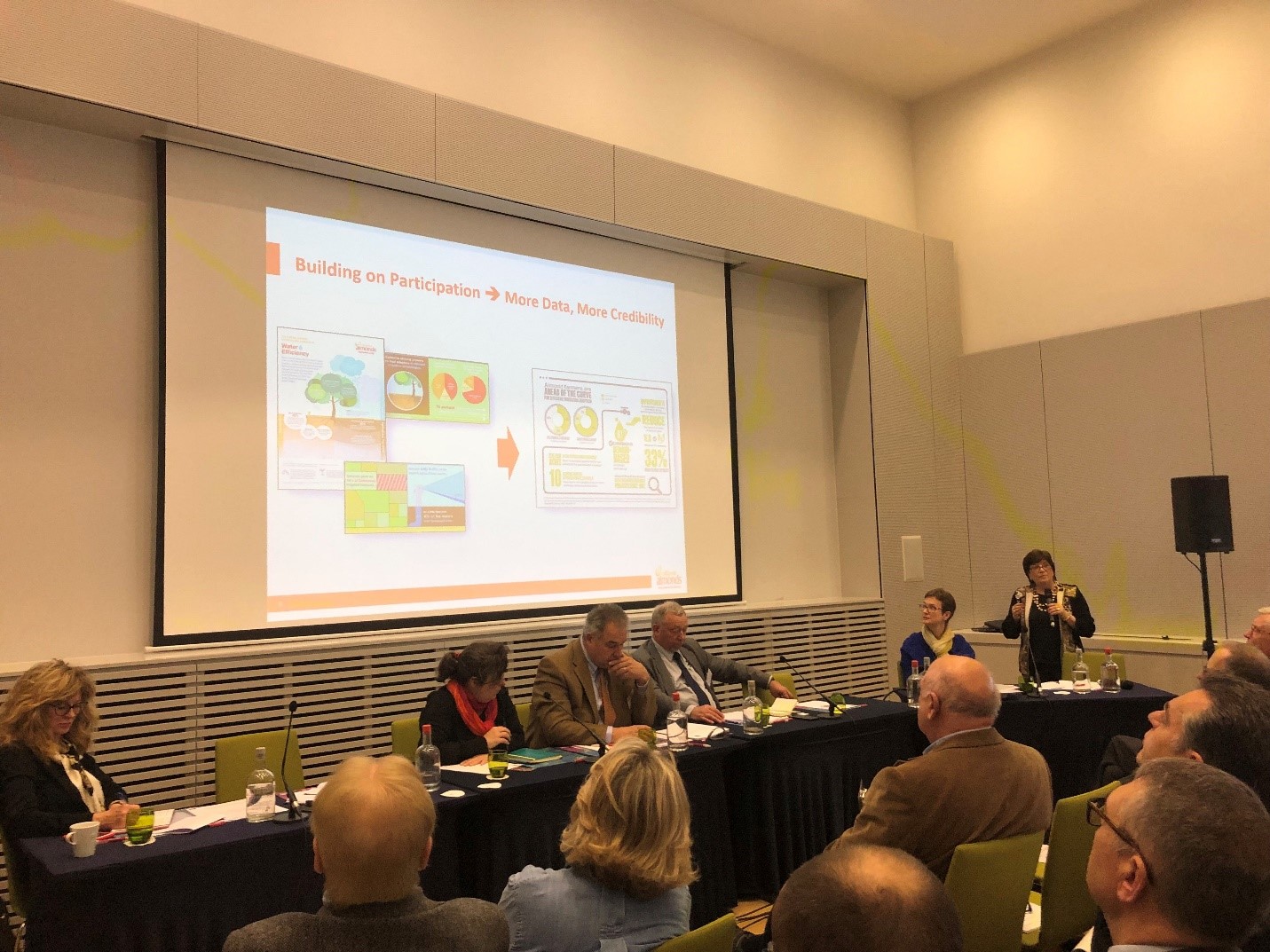The effort to gain more recognition for the California almond industry’s continued commitment to sustainability hit a major milestone in early 2018 with the launch of the California Almond Sustainability Program (CASP) Supply Chain pilot program. The pilot program’s first objective is to allow growers to share data with their processors on a consolidated basis. Building on the results of the pilot, the Supply Chain program’s long-term objective is to act as a channel through which growers’ sustainability achievements may be better communicated to almond buyers using statistically-valid CASP data.
 Adams (far right) reviews almond industry sustainability initiatives during a FRUCOM General Assembly meeting in Brussels on March 22, 2019. FRUCOM is the representative body of the European traders in dried fruit, edible nuts and other select commodities.
Adams (far right) reviews almond industry sustainability initiatives during a FRUCOM General Assembly meeting in Brussels on March 22, 2019. FRUCOM is the representative body of the European traders in dried fruit, edible nuts and other select commodities.
To increase buyer awareness and acceptance of CASP, the Almond Board of California (ABC) entered into a collaboration with the Sustainable Agriculture Initiative (SAI) Platform, a global membership organization made up of large food and beverage companies. SAI Platform’s Farm Sustainability Assessment (FSA) Version 2.1, which consists of 112 questions on good farming practices, was compared with over 200 assessment practices across CASP, plus California regulations, to establish CASP’s alignment with the FSA. SureHarvest, the organization ABC partnered with to support CASP over the last 10 years, and which is now approved by SAI Platform to validate FSA comparisons, carried out the project on behalf of the Almond Board and broader almond industry.
Following the presentation of the results from the comparative analysis between CASP and FSA practices, SAI Platform recognized CASP at a “FSA 2.1 gold” equivalency level. CASP also became the first nut-specific sustainability program to be benchmarked by the FSA program, and it is still only one of two US-based programs that has achieved a “gold” equivalency status.
“We realized there was an opportunity with SAI Platform for growers to get credit for completing CASP assessments,” said Julie Adams, ABC’s vice president of Global Technical & Regulatory Affairs. “Benchmarking our program against a globally accepted sustainable sourcing program shows buyers in the supply chain that our priorities are already aligned with theirs and gives us a common language to talk about sustainable production practices.”
Pilot program delivers value to growers
Growers currently participating in CASP are now able to generate a report that shows them how their practices compare to the FSA. From there, growers have the option to share this information, and the broader results from CASP assessments, with their processors on a voluntary basis. If enough growers opt-in and choose to share their CASP data with their processor (on a consolidated basis), that processor can receive a summarized report on how the practices utilized by their grower base compare with state averages.
This information can be vital to processors looking to share product information with buyers. Going forward, the FSA benchmarking initiative will also allow the California almond industry to see how growers’ practices relate to buyers’ supplier sustainability requirements. This, in turn, could eventually eliminate some of the duplication of supply chain reporting that is currently required of processors.
“This benchmarking with the FSA program should reduce the amount of different forms a grower or handler needs to fill out for different buyers in relation to sustainability,” said Gabriele Ludwig, director of Sustainability and Environmental Affairs at ABC. “Furthermore, if growers want to see how their practices compare to an international assessment, they have access to an additional report based on completion of the nine CASP modules.”
The CASP and FSA benchmarking effort is an important step in building confidence and understanding not only in California almond production practices but also in further establishing the continuous improvement for which this industry is known. Formalizing the partnership with SAI Platform through affiliate membership has also provided new opportunities for the Almond Board to engage directly with various buyers. For instance, Ludwig and other ABC representatives have been invited to various international events to present on the experience of developing CASP and implementing a CASP-FSA reporting approach.
Telling our sustainability story
The importance of the FSA program to buyers in the US and European markets, along with the fact that FSA allows the industry’s existing CASP efforts to serve as the starting point for data, makes the CASP Supply Chain Pilot program a win for early adopters. This partnership with SAI Platform is only one example of the many opportunities the almond industry is pursuing to increase buyer’s awareness of CASP.
The Supply Chain Pilot program is only possible due to the hard work of growers who participate in CASP. Encouraging more growers to participate in CASP will ensure the almond industry is able to continually support outreach regarding growing practices to buyers and to demonstrate the industry’s continued commitment to sustainable farming.